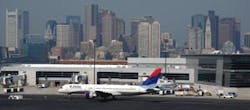A Partnership for Electric
Airlines have begun looking at different avenues of funding in the current economic climate — a climate that has fostered a new level of cooperation between industry partners. In September it was announced that the Massachusetts Port Authority had approved a loan agreement that would lend Delta Air Lines the capital needed to purchase electric equipment for use at Terminal A at Boston Logan International Airport.
Partnership
The agreement originated as the Boston Logan International Airport worked toward Leadership in Energy and Environmental Design certification at Terminal A. “This was one of the provisions we agreed on that we would get electrified ground service equipment in this particular terminal ramp area, so that was an underlying goal that both Delta and Massport wanted to achieve,” says Brian McMorrow, aviation division chief financial officer at Massachusetts Port Authority.
The terminal did achieve LEED certification — the first of its kind in the country — and Delta had a timeframe in which to meet its electric obligation.
But the airline faced the financial woes of the aviation industry, followed by the woes of the financial industry at large. Capital funding was difficult to come by — if it could be found at all.
“The financial industry kind of went south and the cost to borrow money not only dried up, but when it was to be found, it was to be found at an extremely high interest rate,” McMorrow says. “They reached out to us to see if we might be able to partner with them and try and finance some of this project for them.
“As we looked at our finances, we thought this would be a good use of our treasury function where we had money and where we could proceed and meet this important goal,” he says. “It had all the right, important aspects of financing and environmental goals.”
McMorrow continues, “It helped out Delta as a partner with us here at Logan airport. And we were able to do it, I think, in a way that allowed Delta to not spend an enormous amount of money and we would be able to get a reasonable rate of return, equivalent to what we would pay if we were to go to the market and try to borrow.”
Terms of the Agreement
The total cost of the equipment that Delta agreed to purchase — 50 electric baggage tugs, 25 electric belt loaders and charging stations for each vehicle — amounted to about $3.8 million, according to McMorrow.
Massport agreed to finance $3 million for the moveable equipment — the electric baggage tugs and belt loaders. The agreement includes a lien that will ensure the equipment stays at the airport, he explains.
The agreement is for five years at a rate of 5.25 percent. “That’s the rate we think we would get borrowing from the bond market,” he says.
Massport has announced that it’s open to similar agreements with airline tenants. According to McMorrow, it is not currently in talks with other airlines.
Airline Goals
For Delta Air Lines, the financing agreement has been a way to further its environmental initiatives. According to Steve Tochilin, general manager of environmental sustainability at Delta Air Lines, it will be replacing three-quarters of its motorized GSE fleet at Boston Logan with the new electric GSE.
The chargers have been received, as well as about 20 tractors. The remaining equipment will be implemented by the end of the year. “We’re hoping to electrify additional equipment in Boston next year,” Tochilin says.
Though this is a significant increase in the amount of electric GSE at Boston Logan, Tochilin says, the airline has more than 1200 pieces of electric GSE throughout the airline’s fleet.
Along with its environmental initiatives in GSE, the airline has focused on its airplane fleets: retiring older aircraft, modifying aircraft taxiing processes, reducing aircraft weight, and limiting APU use, among other efforts. “The focus on all those initiatives has increased with the ultimate goal being for Delta to reduce its carbon footprint,” he says.
“In general there has been a dramatic decrease because of the initiatives,” he continues. “We’re down by about 30 percent from the year 2000 to now in total amount of fuel it takes to run our operations.”
